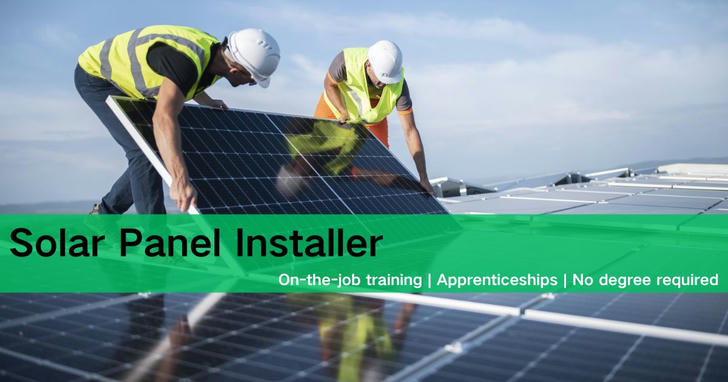High Pay, Low Barrier, No Degree Needed — Solar Panel Installer Jobs
On-the-job training | Apprenticeships | No degree required
Are you tired of warehouse shifts, unpredictable gigs, or jobs that go nowhere? Want to work outdoors, get paid to train, and enter a booming industry with clear promotion paths and real money?
📢 It’s time to consider becoming a Solar Panel Installer in the U.S.—one of the fastest-growing and most promising blue-collar careers today.

☀️ Why Choose Solar Panel Installer Jobs?
The solar industry in the U.S. is exploding—and it's not just hype. With rising energy prices, generous tax incentives, and a national shift toward renewables, solar panel installation jobs have more than doubled in the last decade.
🔴 Demand is projected to grow over 20% from 2024–2030, according to the U.S. Bureau of Labor Statistics (BLS). That’s faster than almost any other job that doesn't require a college degree!
“I started out cleaning warehouse floors. Now I make $70K a year installing panels. No degree. Just hustle.” — Jose M., Lead Installer, Phoenix, AZ
🛠️ What Does a Solar Panel Installer Actually Do?
A solar photovoltaic (PV) installer is responsible for:
- Installing solar panels on rooftops (residential & commercial)
- Setting up mounting systems and wiring
- Testing systems for performance
- Following electrical diagrams and safety protocols
💪 This job is active, outdoors, and physically demanding. You’ll work on rooftops, use tools, and often carry 50+ lbs of gear.
🎓 Education & Training — No Degree? No Problem.
You don’t need a college degree to get started. Many employers are hiring workers with just a high school diploma or GED, and training is often paid.
Ways to enter the field:
- On-the-job training: Many companies offer 2–5 weeks of paid training.
- Trade programs: 6–12 week programs at technical schools.
- Apprenticeships: Learn while earning. Many lead to higher-paying jobs.
- Veterans’ programs: Several solar companies offer special support for ex-military members.
✅ Consider getting OSHA 10 certification (Occupational Safety and Health), which improves your job prospects.
💵 Salary by Experience Level
Here’s how pay typically grows with experience:
| Level | Years of Experience | Job Title | Average Hourly Pay | Yearly Salary Estimate |
|---|---|---|---|---|
| 🟢 Entry-Level | 0–1 year | Junior Installer | $18–$24 | $37,000 – $48,000 |
| 🔵 Mid-Level | 1–3 years | Solar Installer | $25–$32 | $50,000 – $65,000 |
| 🔴 Senior | 3+ years | Lead Installer / Foreman | $35–$45+ | $68,000 – $90,000 |
🛑 In states like California, Texas, and Florida, some senior installers report making over $95K annually with overtime and performance bonuses!
📈 Career Growth Path: From Rooftop to Manager
The career ladder is clear and real—not just a promise on paper.
- Entry-Level Installer
- Experienced Installer
- Lead Installer or Crew Chief
- Site Supervisor / Project Manager
- Sales Consultant or Business Owner
Some installers transition into sales roles, making commissions of $100K+ per year, especially after learning the technical side of solar systems.
📍 Where the Jobs Are
These are the hottest states for solar panel installation jobs:
- California 🔥 – #1 in solar energy adoption
- Texas 🌞 – Rapid residential & commercial expansion
- Florida 🏝️ – Ideal climate, growing demand
- Arizona ☀️ – High sunlight hours, low regulations
- North Carolina – Utility-scale solar boom
How to apply?
You can search “Solar Installer + [Your City]” on Indeed or Glassdoor to find hundreds of active listings.
🏢 Who’s Hiring?
Some of the largest U.S. solar employers include:
- Sunrun
- Tesla Energy
- SunPower
- Momentum Solar
- Trinity Solar
Many offer sign-on bonuses, paid training, and benefits like health insurance and 401(k).
🔧 A Real Story: From Warehouse Cleaner to Lead Installer
Name: David L., 32, from Nevada Before: Cleaning warehouses for $15/hour Now: Lead Installer at SunPower making $72,000/year
“I saw a flyer at the grocery store saying ‘Get paid to install solar.’ I applied, got trained for 3 weeks, and by month 4 I was earning more than I ever made in a year of warehouse work. Now I manage a crew of 6 and even help with system design.”
This kind of transition is becoming more and more common.
❓ FAQs
👉 Do I need to be certified?
Not to start. But certifications like NABCEP can boost your earnings and qualify you for leadership roles.
👉 Is it dangerous?
Like all rooftop work, there’s risk. But companies are required to provide safety training, harnesses, and proper procedures.
👉 Do I need to speak fluent English?
Not necessarily. Many solar crews are bilingual. Basic communication and understanding of tools and safety rules is enough to begin.
🔥 Why Solar Installers Are Winning in 2025
Here’s why this job is way better than most entry-level options:
- ✅ Higher starting pay than warehouse, retail, or food service
- ✅ Get paid to learn — many companies cover training costs
- ✅ Work outdoors, not stuck behind a screen or on concrete floors
- ✅ Long-term job security as solar expands
- ✅ Real promotion path and income growth
🔴 If you're looking for a high-paying job without college debt, solar could be your golden ticket.
🧠 Final Thoughts
Becoming a solar panel installer is one of the smartest career moves in today’s job market—especially if you're hands-on, physically active, and want real money with real growth.
No degree? No problem. No experience? Get paid to learn. Just bring your hustle, and the sun will do the rest.
📚 References
- U.S. Bureau of Labor Statistics – Occupational Outlook for Solar Photovoltaic Installers
- Solar Energy Industries Association (SEIA) – 2024 Solar Market Insight Report
- Indeed.com Salary Tracker – “Solar Installer Jobs by State”
- NABCEP Certification Info
- Testimonial sources compiled from Glassdoor Reviews & Reddit Solar Subreddit (r/solar)
